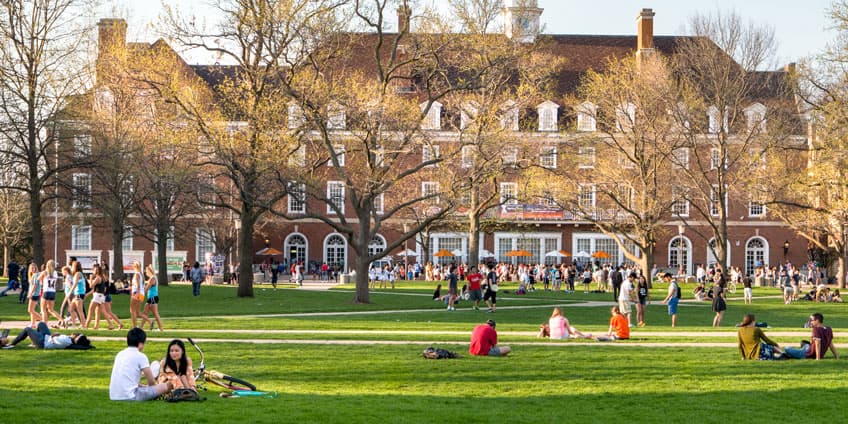
Community colleges are becoming increasingly popular among students from all walks of life. If just 20 years ago they were mostly a solution for low-income families, now they are attractive for the middle and upper-middle class as well. What’s the reason behind their popularity? Should you hop on the bandwagon and go to one too? Let’s find out together.
What Should You Know About Community College?
Wait a second, I came here to find out what a community college is! Okay, we are getting there, you knowledge-thirsty student you.
A community college or a CC is a two-year educational establishment where you can get an Associate’s degree. After that you can either get a job or transfer to a four-year institution for 2 more years where you can finish your Bachelor’s.
But why bother going to a community college and not just enroll in a university right after high school? This is because the benefits of going to community college often outweigh the drawbacks of being a transfer student.
Benefits of Community College
Here are some of the best community college benefits to enjoy.
Flexibility
Today’s students have multiple responsibilities in addition to education. Research indicates that 40 % of them work 30 hours a week and 25 % work full-time. 25 % of students enrolled in undergraduate programs are also older than 25 which imposes even more responsibilities such as having a family, paying for medical insurance and rent, etc.
Amidst writing a college essay, playing with a baby and working full-time, it’s hard to keep your sanity intact. Many aspiring students simply do not have enough physical and mental power to adhere to a rigid university schedule. This is where the importance of community colleges becomes palpable – they allow students to organize their own schedules. Many even offer evening classes, which is a great option for those working during the day.
Quality
For a long time, kids falsely believed that community colleges offered a bad quality of education. This cannot be farther from the truth. More often than not, community colleges actually provide a higher quality of education in comparison to their more traditional counterparts – public universities. Here are some reasons why:
- Smaller class size;
- Lower student-to-faculty ratio;
- Less occupied teachers.
Many students who go to prestigious 4-year institutions end up complaining about stuffy and overcrowded classrooms. Huge lecture halls with a professor in the middle babbling away something incomprehensible – this is a common scene in many modern universities. If you do not want to suffer the same fate, you might want to consider a community college where small class sizes are quite ubiquitous.
In a community college you are more likely to get the attention you need to be a successful student. Teachers are more inclined to talk to you after class, as they are not forced to spend many hours on research like university professors.
Price
Speaking about finances, a low cost is perhaps one of the most commonly listed benefits of going to community college. Did you know that the average annual cost of attending a community college is $ 2, 713 per year, while for a public university this figure goes up to $ 7, 605 per year.
This sum is substantial even for today’s middle class and upper-middle class families. No wonder almost 50 % of all undergraduates in the US choose community colleges.
It is interesting that some of them have agreements with 4-year institutions. They enable transfer students to continue their studies at one of the select universities at a discounted price. So, you can study at a community college for 2 years and then finish your Bachelor’s at a 4-year school at a fraction of the cost. This is possible if you enter the Star Scholarship program in Chicago for an example.
Because community colleges are cheaper, you will not sustain a huge financial loss if you decide to change your major at one point. The youth is the time to explore, make mistakes and seek new opportunities. When you go to a community college, you can rethink your career choice at any time without losing too much money.
Pitfalls of Community College

But it’s not all sunshine and roses. This beloved 2-year institution is not going to be your ticket to a higher education if you fall into one of its pitfalls.
Credits transfer
The problem can be formulated in one sentence – not all credits transfer. As simple as that. Many students do not realize the importance of contacting the university where they want to transfer beforehand. They think – okay, so I need Calc 1 to become a third-year student at this university. I’ll just take it at my local school.
Unfortunately, quite often universities do not accept credits from community colleges. If you do not want to spend time and money on a class you’ll be forced to retake later, you should get in touch with your dream university regularly. It’s better than having to pay for the same credit twice due to some bureaucratic problem.
Student life
Community colleges are cheapest for in-state and in-district residents. If you want to study out of state, the price would often be as high as that of a public university, especially if you add the living costs. Most likely you will end up living with your parents like 50 % of other undergrads. This is not much fun for a young person.
However, if you do not dream about rowdy parties and noisy roommates, this is not a big issue. After all, living with your parents and working a part-time job will allow you to save money for actual travelling rather than the tiresome commuting. And having no chatty roommates will help you focus on your studies rather than gossip.
Success rate
You shouldn’t overestimate community college benefits. They are often overshadowed by the dismal graduation and transfer rates which make you wonder – is it really worth it? Only 60 % of CC students get a Bachelor’s degree within 5 years after obtaining their Associate’s. Why is the rate so low?
The answer can be encapsulated in one word – pressure. Students choose community colleges over public universities when they have a lack of either time or money (or both). 14 % of them admitted to be homeless at one point. No wonder they simply cannot handle the pressure of adding yet another responsibility into their already busy lives.
However, the success rate of CCs is low not because of the instructional quality. It’s low due to the lack of proper funding. The example of Chicago Star Scholarship proves that when students are not forced to combine their studies with 2 part-time jobs, they can graduate in just 2 years and move on to get their Bachelor’s without taking an extensive break.
Community College Vs University

It’s a difficult choice to make, as it depends on many factors. Let’s review some of them.
Funding
Universities are, unfortunately, much better funded than CCs. That is why they offer more generous scholarships to aspiring students, often covering the total cost of education. So, if you are a high-school student thinking where to apply, I suggest you try universities even if they seem unaffordable. But don’t forget to fill in FAFSA and seek out a bunch of scholarships. You may get lucky and start your studies at a public institution right out of high school, thus, avoiding the hustle of being a transfer student.
This tip is especially relevant for low-income students, foreigners and minorities. We personally know many kids who had their education fully covered by the state due to their parents’ low income or diverse background. So, do not hesitate to apply for financial aid, but do not disregard CCs. They are still a fantastic option for every student.
Honors program
Check if a community college of your choice has an honors program. This program enables students to take more advanced classes and graduate faster. It also adds a nice touch to your resume, showing your potential employer or the admission committee that you were an exceptional student.
Perhaps, it will be difficult to transfer to one of the Ivies after a CC, even with an Honors program. But it will definitely be much easier for you to get accepted to one of the universities in your state. And later, if you have a high GPA for your Bachelor’s, you can enroll in an Ivy League school for your Master’s. Sounds like a plan?
The problem with CCs is that many employers still look down on transfer students. They call them “non-traditional” and would normally prefer those who studied in a public university for all four years. That is why if you plan to be a transfer student, you’d better be exceptional or else you’ll struggle with finding a job.
Dual enrollment
If you are still in high school, look for community colleges with a dual enrollment program. It will allow you to complete college level courses while still in high school for free, thus, decreasing the time you will have to spend in a CC.
In this case, a community college is better than a university only if its credits are transferrable. You will need to clarify it before signing up for a dual enrolment program. Otherwise, you will just be putting undue pressure on yourself instead of doing something useful, like preparing for your SATs or ACTs – whatever you need.
Final Words
Hopefully, now you have a clearer picture of the drawbacks and benefits of community college. Even though it’s often underestimated by employers, the attitudes have been shifting continuously. In today’s economic reality, a community college may be the only viable solution for, as statistics reveals, half of all undergraduate students in the US.
According to the Urban Institute study, those with a CC degree earn 20 % more than those with just a high school diploma. This is a substantial increase, and considering that more and more 2-year colleges are becoming free, also a smart investment. So, if you want to go to a community college, go ahead. Your future will be bright if you study hard, ask questions and persevere.